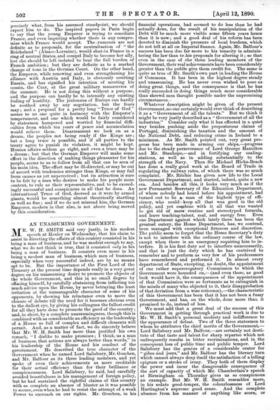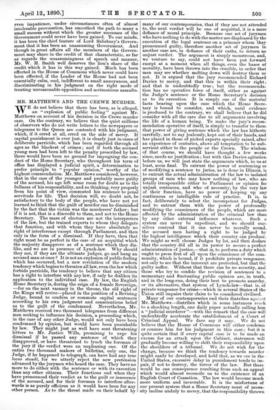AN UNASSUMING GOVERNMENT.
MR. W. H. SMITH said very justly, in his modest speech at Henley on Wednesday, that his claim to assist in directing the affairs of this country consisted in his being a man of business, and he was modest enough to say, what we do not think is true, that it consisted only in his being a man of business. It consists even more in his being a modest man of business, which men of business, especially when very successful indeed, are by no means apt to be. But the importance of the First Lord of the Treasury at the present time depends really in a very great degree on his unassuming desire to promote the objects of the whole Government, and this in no small degree by effacing himself, by carefully abstaining from inflicting too much advice upon the House, by never betraying the least irritation at the unmanageable character of some of his opponents, by showing his reluctance even to move the closure of debate till the need for it becomes obvious even to the dullest eye, by giving his colleagues the fullest credit for all they have done to promote the good of the country ; and, in short, by a complete unassumingness, though this is combined with as considerable an efficiency as the leadership of a House so full of complex and difficult elements will permit. And, as a matter of fact, we do sincerely believe that Mr. W. H. Smith has more than justified his own remark, "I dislike to make promises ; I think, 'as a man of business, that actions are always better than words," in his leadership of the House and his conduct of the government. He described the true character of the Government when he named Lord Salisbury, Mr. Goschen, and Mr. Balfour as its three leading members, and yet spoke of even their achievements as more creditable for their actual efficiency than for their brilliance or conspicuousness. Lord Salisbury, he said, had careftilly avoided boastfulness in his management of foreign policy, but he had sustained the rightful claims of this country with as complete an absence of bluster as it was possible to secure, even when he had to resist the attempt of a weak Power to encroach on our rights. Mr. Goschen, in his financial operations, had seemed to do less than he had actually done, for the result of his manipulation of the Debt will be much more visible some fifteen years hence than it is now ; and a good deal of his reform has been devoted to diminish the pressure of local burdens, which do not tell at all on Imperial finance. Again, Mr. Balfour's success has been due far more to his tenacity in adminis- tering the law than to. his proposals for altering it ; so that even in the case of -the three leading members of the Government, their real achievements have been considerably greater than the public give them credit for. The same is quite as true of Mr. Smith's own part in leading the House of Commons. It has been in the highest degree steady and unassuming. He has never even wished to pose as doing great things, and the consequence is that he has really succeeded in doing things much more considerable than shrewd men thought possible under the unpromising circumstances. - Whatever description might be given of the present Government, no one certainly would ever think of describing it as a "Government of all the talents." But we think it might be very justly described as a "Government of all the industries." Consider only what it has effected in a quiet way besides pushing aside the preposterous claims of Portugal, diminishing the taxation and the amount of the National Debt, and reducing crime in Ireland to a minimum. As Mr. Smith pointed out, very great pro- gress has been made in arming our ships,—progress due to the steady perseverance of Lord George Hamilton and Mr. Stanhope,—and in fortifying our coaling.. stations, as well as in adding substantially to the strength of the Navy. Then Sir Michael Hicks-Beach has done a really good work at the Board of Trade in regulating the railway rates, of which there was so much complaint. -- Mr. Ritchie has given new life to the Local Government Department, and started, indeed, quite a new era. And besides all this, it looks very much as if the new Permanent Secretary of the Education Department, of whom nobody had, heard before his appointment, had turned out to be a- man of the highest type of effi- ciency, -who could-:-keep all that was good in the old policy, and yet ceirthine with it all that was wanted to get rid of mere- routine and stereotyped formula, and leave teaching-talent, zeal, and energy free. Even one Department against which lately there has been the- greatest outcry, the Home Department, has, we contend, been managed with exceptional firmness and discretion. The public seem to forget that the Home Secretary's duty is not to interfere with the ordinary course of the law, except when there is an emergency requiring him to in- terfere. It is his first duty not to interfere unnecessarily, and that is just the duty which he has contrived to remember and to perform as very few of his predecessors have remembered and performed it. In almost every department of State, excepting, no doubt, the appointment of one rather supererogatory Commission to which the Government were hounded on,—(and even there, as good luck would have it, the consequences of the appointment of that Commission were so fortunate as to extinguish in the minds of many who objected to it, their disapprobation of that deviation from a wise reticence),—the characteristic of this Government has been that it has not been a fussy Government, and has, on the whole, done more than it promised to do, instead of less.
We must add that a great deal of the success of this Government in getting through practical work is due to Mr. W. H. Smith's personal modesty and indifference to the appearance of defeat. Two of the three statesmen to whom he attributes the chief merits of the Government,— Lord Salisbury and Mr. Balfour,—are certainly not desti- tute of that taste and talent for sharp repartee which not unfrequently results in bitter recriminations, and in the consequent loss of public time and public temper. Lord Salisbury has the genius of a considerable orator for "gibes and jeers," and Mr. Balfour has the literary turn which cannot always deny itself the satisfaction of a telling epigram or a stroke of irony. They both of them display the power and incur the disagreeable consequence of the sort of capacity, of which Mr. Chamberlain's speech at Birmingham on Thursday gives us so conspicuous an example. But Mr. W. H. Smith resembles more, in his sedate good-temper, the colourlessness of Lord Hartington's supreme good sense. And the complete absence from his manner of anything like scorn, or even impatience, under circumstances often of almost intolerable provocation, has smoothed the path to many a small success without which the greater successes of the. Government could never have been gained. To our minds, it has been the chief feature of Lord Salisbury's Govern- ment that it has been an unassuming Government. And though in great affairs all the members of the Govern- ment may share in the credit of that characteristic, so far as regards the unassumingness of speech and manner, Mr. W. H. Smith well deserves the lion's share of the credit which it has in this way gained. Much has been effected in the House of Commons which never could have been effected, if the Leader of the House had not been essentially calm, cool, indifferent to small annoyances, and. discriminating in his judgment on the right mode of treating unreasonable opposition and acrimonious assaults.



































 Previous page
Previous page